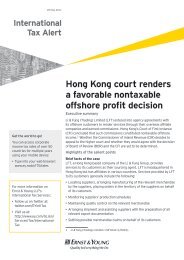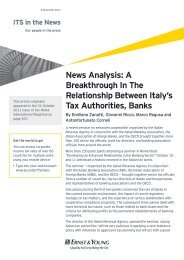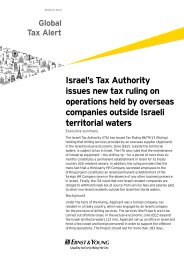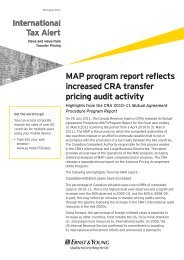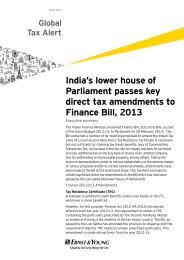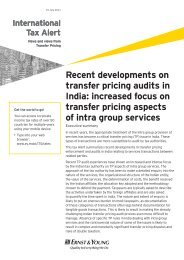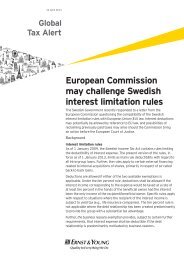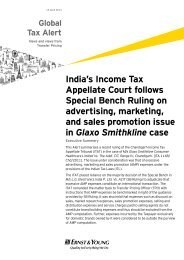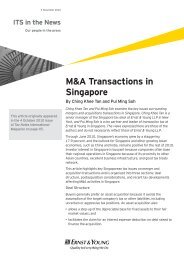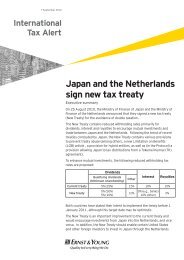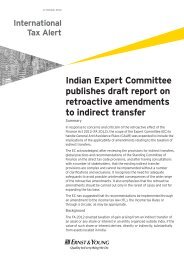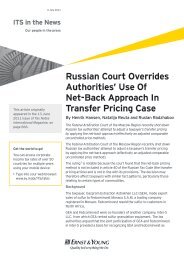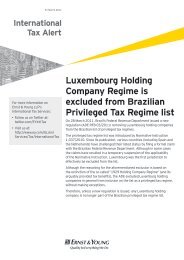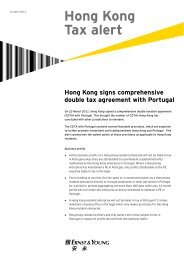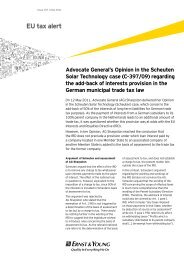Download - Ernst & Young T Magazine
Download - Ernst & Young T Magazine
Download - Ernst & Young T Magazine
Create successful ePaper yourself
Turn your PDF publications into a flip-book with our unique Google optimized e-Paper software.
News Credit: Getty / ChinaFotoPress<br />
Tax reform in the spotlight<br />
Share of labour force<br />
Canada<br />
Ireland<br />
United Kingdom<br />
New Zealand<br />
United States<br />
0%<br />
% foreign<br />
% native<br />
20.7%<br />
21.2%<br />
Source: MARC M&A Maturity Index<br />
Source: OECD, 2011<br />
The freedom to move<br />
May 2004<br />
Expansion of the<br />
European Union<br />
gives residents of<br />
10 more countries<br />
the right to move<br />
freely within the EU.<br />
26.0%<br />
31.5%<br />
29.3%<br />
30.0%<br />
37.5%<br />
38.9%<br />
43.5%<br />
46.9%<br />
20% 40% 60%<br />
September 2006<br />
The G20 calls for<br />
international tax<br />
transparency to<br />
be “vigorously<br />
addressed”.<br />
__ In recent decades large corporations have explored every corner of the world<br />
in search of new growth. Between 1976 and 2007, the number of multinational<br />
companies expanded nearly eightfold, from 11,000 to 79,000, according to<br />
United Nations Conference on Trade and Development (UNCTAD). These<br />
businesses now compete at a global level to attract, retain and develop the<br />
best talent for their enterprises.<br />
In 2011, the main motivation for sending an executive abroad was involvement<br />
in a specific project; anything from an engineer on a mining survey to a manager<br />
overseeing a merger. Close behind this were managerial assignments – often with<br />
specific leadership or strategic components aimed at filling skill gaps, spreading<br />
corporate procedures or developing local talent.<br />
Naturally, with the economic turmoil of recent years, international expansion<br />
has slowed for many large companies. From 2008 to 2010 there was a steady<br />
decrease in employees on short-term assignments. However, in 2011 this trend<br />
reversed and today more companies are sending a larger percentages of<br />
employees on short-term international assignments. Interestingly, where<br />
long-term investments were concerned the global economic crisis did not have<br />
such a large effect. In other words, companies continued to see the need for<br />
long-term assignments throughout the economic downturn.<br />
Net migration<br />
Top 20 importers Top 20 exporters<br />
Country Net for 2007–2011<br />
1 United States 4,954,924<br />
2 United Arab Emirates 3,076,634<br />
3 Spain 2,250,005<br />
4 Italy 1,998,926<br />
5 Russian Federation 1,135,737<br />
6 Australia 1,124,639<br />
7 Canada 1,098,444<br />
8 Saudi Arabia 1,055,517<br />
9 United Kingdom 1,020,211<br />
10 Qatar 857,090<br />
Source: World Bank<br />
2006 2008 2009<br />
February 2008<br />
The UK begins<br />
phased introduction<br />
of points based<br />
immigration.<br />
September 2008<br />
The global financial<br />
crisis begins to slow<br />
the movement of<br />
workers.<br />
Country Net for 2007–2011<br />
1 India 2,999,998<br />
2 Bangladesh 2,908,015<br />
3 Pakistan 1,999,998<br />
4 China 1,884,102<br />
5 Mexico 1,805,238<br />
6 Indonesia 1,293,089<br />
7 Philippines 1,233,365<br />
8 Zimbabwe 900,000<br />
9 Peru 724,999<br />
10 Morocco 675,000<br />
June 2009<br />
The first-ever High<br />
Level Policy Forum<br />
on Migration held at<br />
the OECD.<br />
May 2009<br />
The European<br />
Parliament backs<br />
the introduction of<br />
the ‘blue card’, an<br />
EU-wide work<br />
permit.<br />
6 T <strong>Magazine</strong> Issue 07 <strong>Ernst</strong> & <strong>Young</strong>



